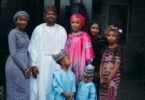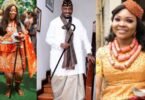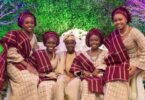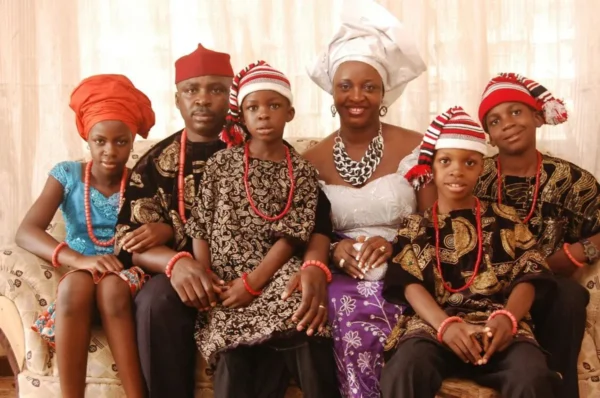
Igbo fashion as an artistic expression is in a class of its own since it expounds more than just fashion trends, but narrates the history of an alive culture. And, while the trademark Aso Ebi, a uniform dress worn at events to signify togetherness is the recognized part of the Nigerian fashion, the Igbo fashion is more than that embracing history, ideas, and intelligence of the Igbo people.
Starting from the complex designs of traditional wear down to the use of icons for accessories, Igbo fashion can be said to hold culture, beauty, uniqueness, and pride in a community.
In this article, we pay attention to particular aspects of Igbo clothing and look into its details and meaning.
1. The Foundations of Igbo Fashion
In general, one might state that the basic values of the Igbo aesthetic clothing are the people’s belongings, unity, and festive dress code. Every single attire is a performance, computed to express the status, age, and circumstances in which it is worn.
Traditional vs. Modern Igbo Fashion
- Traditional: Rooted in heritage, traditional Igbo attire is characterized by handcrafted fabrics, symbolic patterns, and cultural significance.
- Modern: Contemporary Igbo fashion blends tradition with modern aesthetics, often using trendy cuts and globally influenced designs while retaining cultural elements.
Key Fabrics in Igbo Fashion
- Akwete Cloth: A traditional Igbo fabric woven with intricate designs, often reserved for special occasions.
- George Fabric: A luxurious material imported from India, widely used for women’s wrappers in ceremonies.
Ankara: Known for its vibrant patterns, Ankara has become a staple fabric that bridges traditional and modern styles.
2. Traditional Igbo Attire: A Showcase of Heritage
Men’s Attire
- Isiagu: The Isiagu shirt, a symbol of dignity and authority, is a staple for men. Often adorned with lion head motifs, it is paired with a wrapper and a red cap to signify status.
- Wrappers and Accessories: Men tie richly colored wrappers around their waists and accessorize with walking sticks and beaded necklaces for formal occasions.
Women’s Attire
- Wrapper and Blouse: The traditional outfit for women consists of a wrapper paired with a fitted blouse. For special events, the wrapper is made from George fabric or richly embellished lace.
Head Ties and Beads: Women complete their look with elaborate head ties (ichafu) and coral beads, enhancing their regal appearance.
3. Beyond Aso Ebi: The Essence of Igbo Fashion
Aso Ebi, though popular in Nigerian culture, represents only a fraction of Igbo fashion. The essence of Igbo fashion lies in its individuality and connection to cultural values.
Personal Expression
Unlike the uniformity of Aso Ebi, traditional Igbo attire often allows individuals to express their identity. Fabrics, colors, and accessories are chosen to reflect personal style and status.
Cultural Storytelling
Each piece of Igbo fashion tells a story, whether it’s the lion motif on an Isiagu shirt symbolizing strength or the coral beads that represent wealth and prestige.
4. Fashion in Ceremonial Contexts
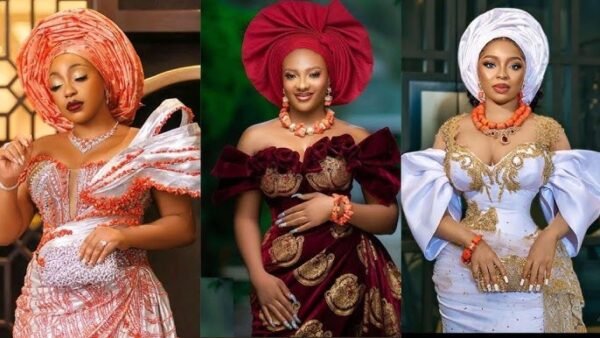
Igbo ceremonies are grand events where fashion takes center stage.
Weddings
The Igba Nkwu (traditional wedding) is a spectacle of colors, fabrics, and accessories. Brides typically wear wrappers adorned with intricate beadwork, while grooms don Isiagu shirts and matching wrappers.
Festivals
During festivals like the New Yam Festival (Iri Ji Ọhụrụ), attendees don traditional attires to celebrate cultural pride. The use of vibrant colors and intricate designs highlights the joy and significance of the occasion.
Titled Individuals
Traditional titles, such as Ichie or Nze, come with distinctive attire, including robes, red caps, and beaded accessories that signify the individual’s rank and contributions to the community.
5. The Role of Accessories in Igbo Fashion
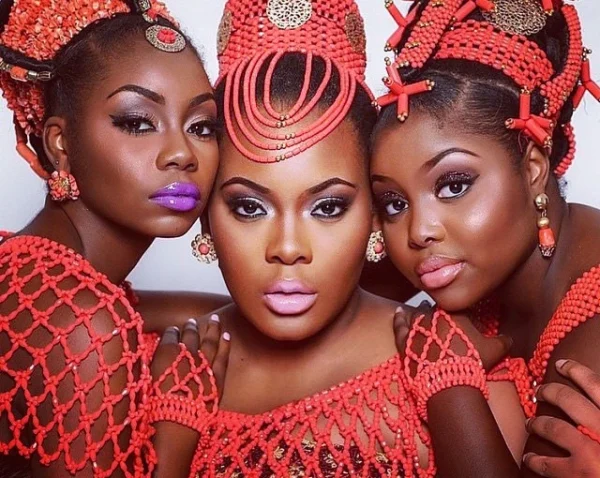
Accessories are integral to Igbo fashion, adding layers of meaning and elegance to every outfit.
Coral Beads
- As pendants, bangles and ankle ornaments, coral beads are also referred to as wealth, beauty and nobility.
- These beads are especially significant for brides and titled individuals during ceremonial events.
Headgear
- For women, the ichafu (head tie) is a canvas for creativity, styled in elaborate designs that complement their attire.
- For men, the red cap is a symbol of authority and respect within the Igbo community.
Walking Sticks and Fans
- Walking sticks are a staple for titled men, signifying leadership and wisdom.
- Women often carry beautifully crafted fans, adding a touch of grace and sophistication.
6. Igbo Fashion in Modern Times
Changes that have taken place in the aspect of fashion among the Igbo people are an indication of the dynamism of the said community.
Fusion of Old and New
- Designers now create outfits that blend traditional fabrics like Akwete with contemporary cuts, making Igbo fashion accessible to a younger audience.
- Accessories like beaded necklaces are paired with modern outfits, ensuring the continuity of cultural symbols.
Influence of Nollywood
Nigeria’s film industry, Nollywood, has played a crucial role in promoting Igbo fashion. Movies often feature traditional attire, inspiring viewers to embrace and modernize these styles.
Global Appeal
Through social media and diaspora communities, Igbo fashion has gained international recognition. Events like cultural fashion shows and exhibitions celebrate the uniqueness of Igbo attire on a global stage.
7. The Significance of Colors in Igbo Fashion
Colors are more than aesthetic choices; they carry deep cultural meanings.
Red: Represents strength, vitality, and power.
White: Symbolizes purity and peace, often worn during traditional rites.
Gold: A mark of wealth, prosperity, and celebration.
Blue: Reflects tranquility, wisdom, and harmony.
8. Preserving Igbo Fashion Culture
Efforts to preserve Igbo fashion include:
- Education: Teaching younger generations about traditional weaving, tailoring, and bead-making.
- Cultural Events: Organizing fashion shows and festivals to showcase Igbo attire.
Digital Platforms: Using social media to document and promote Igbo fashion globally.
Conclusion
Igbo fashion is a dynamic situation with the styling and flavour of personality and pride. The book goes further than the popular Aso Ebi to paint a picture of a vibrant people whose fabric of attire and celebration speaks of individualism, communal living and cultural affiliation.
From the royal look of the Isiagu to the detailed works on a bridal groom, the Akwete wrapper till date, is a clear indication of the creativity and resourcefulness of the Igbo people. Igbo fashion cannot be subjected to mere formal dissection and instead defines fashion itself because it opposes both the stasis of tradition and the stagnancy of newness and cold modernity while at the same time cherishing both.

